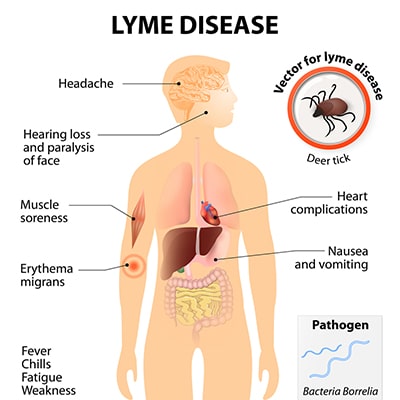Recovering From Lyme Disease Starting With Your Gut
Many of those struggling with Lyme disease can feel completely helpless.
Your symptoms are hindering your quality of life. And perhaps, each day seems like a new discovery of how this tick-borne illness keeps affecting your body.
Over 300,000 people per year are diagnosed with Lyme disease which is 1.5 times more than the number of women diagnosed with breast cancer each year.
This shows the impact the bacteria Borrelia burgdorferi has on the United States.
This tick-borne illness is a multi-system health issue, which mainly affects your nervous system. But a large number of Lyme disease sufferers battle with gut issues as well.
And poor gastrointestinal health can be a precursor to a slew of other unwanted health conditions with Lyme disease.
So knowing how to heal from a gut perspective from Lyme disease could be crucial to your health.
Lyme Disease and the Gut Connection
The Lyme–gut connection has many Lyme disease carriers struggling with debilitating gut issues.
From nausea to constipation or diarrhea the bacteria infection from Lyme disease can cause some major stomach problems, which can be hard to pinpoint the problem.
Transferred through infected deer ticks, the bacteria Borrelia burgdorferi enters your body and wreaks havoc on your immune system.
This bacteria is surprisingly intelligent and sequesters itself in your tissues, dogging vigorous Lyme disease treatments – making it hard to eradicate the bacteria.
As the spirochete bacteria evades treatment it causes chronic inflammation and immune dysregulation. And since 70-80% of your immune system is located in your gut, Lyme disease has a major impact on gut health.
Chronic gut inflammation and dysbiosis can eventually lead to other health issues such as:
- Leaky gut syndrome
- Small intestinal bacterial overgrowth
- Autoimmune diseases
- Diabetes
- Food allergies
- Irritable bowel syndrome
Some of the most common gut issues associated with Lyme disease are leaky gut syndrome, small intestinal bacterial overgrowth (SIBO), and irritable bowel syndrome.
And sometimes those suffering from SIBO, leaky gut, or IBS are unaware their underlying cause might be Lyme disease.
Although the early sign for Lyme disease is an erythema migrans rash, up to 30% of people don’t develop this rash. They might not have any symptoms at all besides their gastrointestinal issues which can prolong treatment of Lyme disease and can be potentially dangerous.
If you have SIBO, leaky gut, or IBS and struggle with finding your root cause ask your doctor to test for Lyme disease.
How Lyme Disease Can Lead to SIBO
Small intestinal bacterial overgrowth occurs when a shock to your intestines causes some type of gut dysbiosis.
Gut bacteria migrate from your colon to your small intestine causing mayhem in your gut – bloating, gas, diarrhea, and constipation.
Two significant causes of SIBO include infections and antibiotic medications. Both of these occur with Lyme disease – an infection by Borrelia burgdorferi and vigorous antibiotic treatment.
These two causes can “shock” your intestines and the normal flow of bacteria in your gut gets shaken up – inviting bacteria to overgrow in your small intestine.
Also, Lyme disease affects your nervous system including the autonomic nervous system in your gut.
This slows down gut motility and the proper descending of gut bacteria through the gastrointestinal tract.
The infection and treatment of Lyme disease have a crucial impact on your gut.
Focusing on your gut health with Lyme disease can help prevent SIBO and their unwanted symptoms such as bloating, abdominal discomfort, diarrhea, and constipation.
Lyme Disease, Gut Inflammation, and Leaky Gut
Lyme disease causes immune system inflammation including inflammation in your gut. Gut inflammation can cause an array of other health issues.
A crucial one though – leaky gut syndrome – can be a precursor to other health diseases, which is why gut health is so important. Gut inflammation experienced with Lyme disease can cause the tight junctions in your intestines to loosen.
This allows particles, bacteria, and viruses to pass through to your bloodstream.
Specifically, the cytokines in your system from your Lyme disease causes intestinal permeability. Leaky gut syndrome can further your local and systemic immune response with Lyme disease.
Leaky gut can eventually lead to other health issues along with your Lyme disease such as:
- Food allergies
- Autoimmune hepatitis 1
- Inflammatory joint disease
- Diabetes
- Celiac disease
- Autism
- Colon cancer
- Inflammatory bowel diseases
- Fibromyalgia
For this reason, Lyme disease affects multiple parts of the body mostly stem from your gut health.
All of these can contribute to you mysterious symptoms related to Lyme disease.
Atrantil for Supportive Gut Health
When your immune system is down from Lyme disease your body isn’t able to fight off infection. This trickles down and causes multiple other health issues, which can be difficult to pinpoint the exact cause.
It’s as if your body has gone haywire and you don’t know where to begin treatment.
Since most diseases start in the gut, focusing on gut health with Lyme disease can accelerate your healing process. Multiple diseases are linked to your gut health and Lyme disease has a major impact on your immune system and gut.
Strengthening your immune system through your gut microbiome to fight off infection and other diseases associated with Lyme diseases is important.
If you want relief from stomach problems with Lyme diseases try Atrantil’s digestive health supplement.
By reducing inflammation, improving gut health, and rebuilding your immune system Atrantil can keep you on the road to the digestive health needed for Lyme disease recovery.
Atrantil’s natural supplement helps get your digestive health back on track.
With its polyphenol prebiotics, Atrantil strengthens your healthy gut bacteria to fight off infection naturally while repairing your gut permeability.
It’s also important to promote better digestive health while vigorously treating Lyme disease with antibiotics.
Taking Atrantil can help prevent further gut dysbiosis which leads to SIBO, IBS, and leaky gut syndrome.


Small intestine inflamed but no sibo gastro didn’t seem to help
Hi Lorraine,
Thank you for your feedback. We are sorry your gastro was not of assistance. If you have bloating and abdominal discomfort, with/without diarrhea, constipation or both, then Atrantil may be a solution for you!
Best wishes,
Support Team